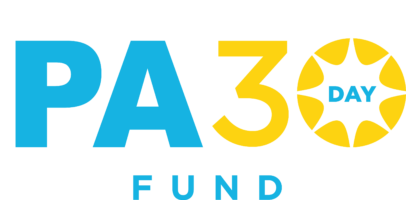Pennsylvania 30 Day Fund helps small businesses stay afloat during the pandemic
Prentice Michael Boone, 41, wanted his own barbershop for so long, he wrote the business plan before he even graduated from high school. Then three years ago, he did it. He opened Haute Barber near Temple University.
“I dreamed this thing, and God made it possible,” Boone said.
But along came COVID-19. It shut down Boone’s shop and many businesses like his. The North Philly barber applied for private and government aid to no avail. Even his own bank turned him down.
Enter the Pennsylvania 30 Day Fund — a nonprofit, volunteer-run effort to get forgivable loans up to $3,000 to small businesses like his during these trying times.
Not only did Boone get the funding fast, he got a personal thank-you from one of the fund’s directors for the work he did as part of the community.
“Somebody’s finally seeing the pain of the micro-business,” he said.
They’re seeing it — and they’re responding. Since the Pennsylvania 30 Day Fund kicked off on May 6, it has raised about $1.8 million and helped nearly 500 small businesses around the state that employ between three and 30 employees. And it’s still going strong.
“Our small business owners are in many ways the heart and soul of our communities,” said Jeff Bartos, a Montgomery County real estate developer (and a former candidate for Pennsylvania lieutenant governor) who is one of the fund’s founders. He got the idea from his old friend and fellow businessman Peter Snyder, who started a similar fund in Virginia. “We’re all committed to helping and that’s such a unifying mission. I think hope is very much alive.”
The fund is led by volunteers, including notable business leaders (like Shop Rite CEO Jeff Brown) as well as Penn law and business students who donate their time to review the thousands of applications. The money given is called loans, but the small-business recipients aren’t required to pay them back. If they can, however, the repaid funds go toward helping other business people in need.
The 30 Day Fund has attracted some corporate funding, and philanthropists Ira Lubert and Pam Estadt have pledged a $1 million grant to match others’ contributions.
But most of the donors have been regular folks, Bartos said — someone who made a $3 donation online, people who contributed their stimulus checks, a Philadelphia police officer who gave $1,000 to help rebuild businesses that were damaged during recent protests.
So far, over 200 Philadelphia area businesses have been aided, about 40% of them minority-owned and 40% female-run. For some, the 30 Day Fund loan is a part of a patchwork of aid that’s helping them get by. For others it’s a bridge loan while they wait for other funding to come through.
“At the heart of it, all of us are struggling for that same goal,” Bartos said. “We love our communities. We love the businesses in our communities. We want them all to survive.
Thane Wright opened his Bower Café in the Washington Square West section of Philadelphia two years ago in June after a career managing and directing other people’s higher-end cafés.
“It’s a dream of mine that I’ve envisioned, and now it’s living,” Wright said. “It’s my baby.”
He was still implementing his vision for the restaurant and gallery when the coronavirus struck.
Wright had gotten some aid, but was turned down for other sources of help. The 30 Day Fund process was quick and easy, he said. The $3,000 loan helped with back rent.
“We’re not [yet] open for full service,” Wright, 44, said in late July. “I’m still a month behind.”
Tanti Lina, owner of Papertini, a Landsdowne florist and event design business, also put her 30 Day Fund loan toward rent arrears. Her business depends a lot on events like weddings, and she estimates her revenues for this year are down 90 percent. She had to lay off six of her seven employees. Since then, Lina has been seeking whatever business aid is available. Her plan is to rehire her workers when their unemployment benefits run out.
“I’m saving up for when that happens. I’m going to bring them back whether or not we have gigs,” said Lina, 41, an Indonesian immigrant who is now a U.S. citizen. “They’re my family.”
Lina, who started Papertini 14 years ago, said she was struck by how well she was treated in the 30 Day Fund application process.
“The turnaround time was very quick, and they personally call you,” Lina said. “What I will always remember is they said, ‘We believe in you and so we’re going to grant you this.’ Which I really appreciated. At times like this, it’s kind of nice to get an assurance that what I’m doing is not crazy, you know?”
In fact, though cash is still tight, Lina said she has already paid $100 back to the fund even though it was not required. Plus, she has contributed to two Go Fund Me drives for businesses damaged during the recent protests.
“The concept of the 30 Day Fund is what inspired me,” Lina said. “If I can do at least a little bit, I should help.”
Lokal Artisan Foods’ tasty French toast bites were earning an avid following at outdoor festivals all over Philly last year, but then COVID-19 hit, canceling the gatherings.
But Lokal’s owner Charisse McGill was no quitter. A business friend, Tamekah Bost, owner of the Better Box restaurants and food truck, offered the use of her commercial kitchen, and McGill pivoted to a delivery-based business model.
“We were operating at 50% less revenue than we would have during normal times, but it kept me above water,” McGill said.
When she got a vendor’s spot in Spruce Street Harbor Park on the Delaware River, she applied for and received a loan from the 30 Day Fund that allowed her to buy commercial kitchen equipment, personal protection equipment, contactless thermometers, and cleaning supplies she needed to open her new eating establishment on July 17.
Lokal’s French toast bites — regular and vegan, French toast milkshakes, and bacon on a stick — are finding a warm welcome among riverfront revelers.
“We’re already operating as if it was normal time in terms of sales, and that’s just the first two weeks,” said McGill, 38, of Alden. “We’re back on track. We have to keep pushing until the park closes September 27.”
The businesswoman is already thinking about the future.
“In 2021, we’ll start to look for a brick-and-mortar storefront,” she said. “With 30% of the restaurants not reopening amid COVID, I’m planning to find a good lease deal.”
In the meantime, McGill is enjoying what feels like a sweet summer at last.
“Everyone’s enjoying food and the outdoors and fun just like before,” she said. “Everybody’s just six feet apart, and we have a mask on now. But the excitement is still there.”
Read full story HERE.


